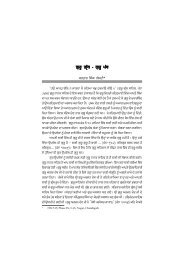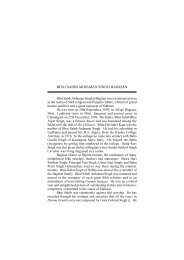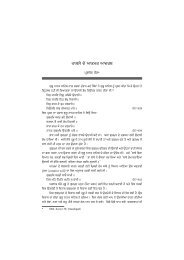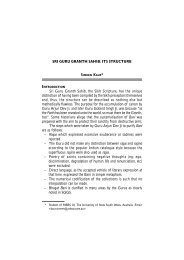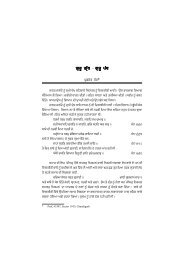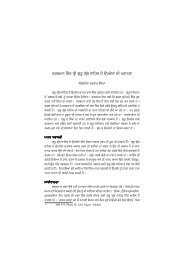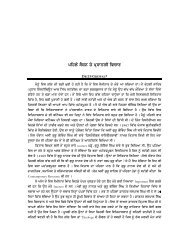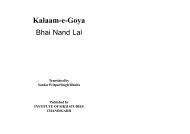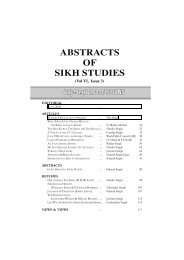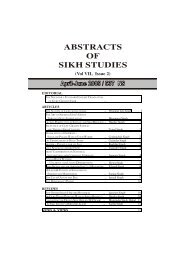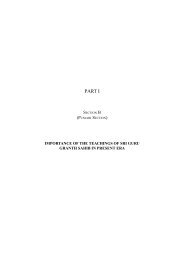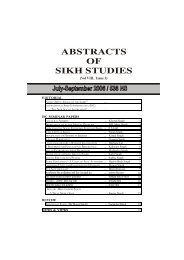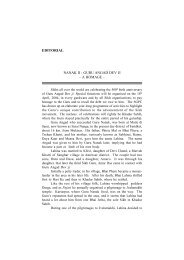3-sawan singh - Institute of Sikh Studies, Chandigarh
3-sawan singh - Institute of Sikh Studies, Chandigarh
3-sawan singh - Institute of Sikh Studies, Chandigarh
You also want an ePaper? Increase the reach of your titles
YUMPU automatically turns print PDFs into web optimized ePapers that Google loves.
FOUNDATIONAL UNITY OF THOUGHT IN GURU NANAK - GURU GOBIND SINGH JI<br />
FOUNDATIONAL UNITY OF THOUGHT IN GURU<br />
NANAK - GURU GOBIND SINGH JI<br />
PRINCIPAL SAWAN SINGH*<br />
Though Guru Nanak and Guru Gobind Singh lived about 200<br />
years apart in different circumstances, they were united by Unity <strong>of</strong><br />
thought. Both uplifted the masses , promoted human values and<br />
religious harmony. They aimed to give the people a life <strong>of</strong> dignity.<br />
Some people think that Guru Gobind Singh, by making it mandatory<br />
for the <strong>Sikh</strong>s to wear the five symbols and by taking arms against the<br />
tyrants, had deviated from the path laid down by Guru Nanak who is<br />
said to have opposed the symbols and condemned violence. Some<br />
misguided <strong>Sikh</strong> youth say that they are followers <strong>of</strong> Guru Nanak Dev<br />
and not <strong>of</strong> Guru Gobind Singh. Even some historians think that Guru<br />
Nanak never thought <strong>of</strong> anything else than the saintliness in life, but<br />
sword- wielding Guru Gobind Singh turned the <strong>Sikh</strong> religion into a<br />
brotherhood <strong>of</strong> warriors and soldiers. This may seem contradictory,<br />
but actually it is not the case. There is a great misrepresentation <strong>of</strong><br />
facts. The evolution <strong>of</strong> the <strong>Sikh</strong> religion has been misinterpreted.<br />
Those who point out this contradiction seem to have either<br />
misunderstood the message <strong>of</strong> Guru Nanak or they have not read the<br />
message carefully enough. The spiritual unity <strong>of</strong> Guru Nanak has<br />
never been broken and the spirit <strong>of</strong> Guru Nanak worked in Guru<br />
Gobind Singh.<br />
Guru Nanak and Guru Gobind Singh both thought that our<br />
earth was the abode <strong>of</strong> Dharma where one could practice Dharma, do<br />
acts <strong>of</strong> righteousness and achieve spiritual excellence. Guru Nanak<br />
says: rwqI ruqI iQqI vwr ]pvx pwxI AgnI pwqwl ] iqsu ivic DrqI Qwip<br />
rKI Drm swl ]( pMnw 7) “God has established earth as a home <strong>of</strong> Dharma in<br />
the midst <strong>of</strong> nights, days, weeks, seasons, wind, water, fire and the nether regions.”<br />
eyko Drmu idRVY scu koeI ](pMnw 1188 )<br />
* Principal (Retd) #10561 Brier Lane, Santa Ana, California, US <strong>sawan</strong><strong>singh</strong>85@gmail.com<br />
23
24<br />
ABSTRACTS OF SIKH STUDIES: OCT-DEC 2012 / 544 NS<br />
“One should remain firm on truth”.<br />
Guru Nanak has , thus, identified Dharma with Truth.<br />
Guru Gobind Singh also writes in Bachitar Natak that he was<br />
sent by the Lord to spread Dharma:<br />
hm ieh kwj jgq mo Awey ] Drm hyq gurdyv pTwey ]<br />
“ I have come for the spread <strong>of</strong> Dharma. My Lord has sent me to spread<br />
Dharma”.<br />
Guru Nanak and Guru Gobind Singh both were householders<br />
and condemned asceticism. Guru Nanak has advised us not to wander<br />
in forests and on the river banks in search <strong>of</strong> God:<br />
jY kwrix qit qIrQ jwhI ] rqn pdwrQ Gt hI mwhI ] (pMnw 152)<br />
‘(Oman!) the invaluable jewel(God), in whose search you go to the banks <strong>of</strong><br />
the streams and holy places, lies in your heart”.<br />
Guru Gobind Singh also liked the life <strong>of</strong> a householder and has<br />
written in the Dasam Granth:<br />
ry mn AYso kir sMinAwsw ]<br />
bn sy sdn sBY kir smJhu mn hI mwih audwsw ] (pMnw 1539)<br />
“O mind! Practice renunciation in this way: Consider all the dwellings to<br />
be the forest and remain detached at heart”.<br />
Guru Nanak and Guru Gobind Singh both spoke against<br />
observing rituals and superstitions, but not against symbols. Symbols<br />
and rituals are not synonymous. It is wrong to say that Guru Nanak<br />
was against symbols such as Jeneu. He was actually against the show<br />
<strong>of</strong> religious symbols without any purity <strong>of</strong> mind and conduct. He<br />
wanted the wearer <strong>of</strong> the sacred thread to have the qualities <strong>of</strong><br />
compassion, contentment, modesty and truth. He has said:<br />
dieAw kpwh sMqoKu sUqu jqu gMFI squ vtu ]<br />
eyhu jnyaU jIA kw heI q pwfy Gqu ] (pMnw 471)<br />
“Make compassion the cotton, contentment the thread, modesty the knot<br />
and truth the twist.<br />
This is the sacred thread <strong>of</strong> the soul; if you have it, then go ahead and put<br />
it on me”.<br />
Guru Nanak was against those Brahmins who enjoyed the<br />
privileges <strong>of</strong> the society and exploited their followers, especially low<br />
caste Hindus. They enforced useless and expensive rituals and<br />
ceremonies. Guru Nanak wanted to give those arrogant Brahmins a<br />
lesson in humility and compassion. In the next quote, Guru Gobind<br />
Singh also advised his followers to shun the meaningless rituals
FOUNDATIONAL UNITY OF THOUGHT IN GURU NANAK - GURU GOBIND SINGH JI<br />
practiced by Brahmins:<br />
jb ieh ghY ibprn kI rIq[[<br />
mYN n kroN ien kI prqIq[[ (srb loh gRMQ)<br />
“When the Khalsa adopts rituals <strong>of</strong> Brahmins, I shall not stand by<br />
him”.<br />
Guru Nanak and Guru Gobind Singh both believed that rituals<br />
had no importance and were repetitive actions done in religious<br />
ceremonies, but they also believed that symbols were required as<br />
distinguishing marks in a religious system.<br />
Both <strong>of</strong> them reprimanded those who wore symbols without<br />
being virtuous and condemned hypocrisy. Guru Nanak says:<br />
kwdI kUVu boil mlu Kwie ] bRwhmxu nwvY jIAw Gwie ](pMnw 662)<br />
“The Qazi utters falsehood and eats filth. The Brahman slays life<br />
and then bathes at the pilgrim stations”.<br />
icty ijn ky kpVy mYly icq kTor jIau ]<br />
iqn muiK nwmu n aUpjY dUjY ivAwpy cor jIau ] (pMnw 751)<br />
“Those persons who wear white clothes (saintly attire), but have a dirty and<br />
ruthless mind, and do not meditate on God, are engrossed in duality; they<br />
are thieves”.<br />
Guru Gobind Singh proved this point by once having a donkey<br />
don the skin <strong>of</strong> a lion. While the donkey caused terror for a short<br />
while, it eventually brayed by sheer habit and was badly beaten. Thus<br />
Guru Ji gave a practical demonstration <strong>of</strong> his conviction.<br />
Both the Gurus preached against idol worship and advised their<br />
followers to meditate on omnipresent God . Guru Nanak has said:<br />
pwQru ly pUjih mugD gvwr ]<br />
Eih jw Awip fuby qum khw qrxhwru ] (pMnw 556)<br />
“The ignorant fools pick up stones and worship them. These stones,<br />
themselves, sink low. How can they ferry others across (the world ocean)?”<br />
Guru Gobind Singh was also strongly against idol worship. In<br />
Zafar Naama, a letter in Persian poetry he wrote to Aurangzeb, he<br />
calls himself But Shikan ( breaker <strong>of</strong> idols).<br />
Definition <strong>of</strong> God given by Guru Nanak in the beginning <strong>of</strong> Sri<br />
Guru Granth Sahib tallies with that <strong>of</strong> Guru Gobind Singh given in<br />
the next quote taken from Jaap Sahib:<br />
c~qR c~kR vrqI c~qR c~kR Bugqy ]<br />
suXMBv suBM srbdw srb jugqy ]<br />
“O lord! Thou art present on all the four sides and Thy order prevails<br />
25
26<br />
ABSTRACTS OF SIKH STUDIES: OCT-DEC 2012 / 544 NS<br />
everywhere. Thou art self- existent, beautiful and present in all living beings”.<br />
Guru Nanak Dev and Guru Gobind Singh both believed in the<br />
equality <strong>of</strong> mankind and tried to uplift the backward and down-trodden<br />
people. Neither <strong>of</strong> them believed in the caste -system. Guru Nanak<br />
Dev preferred to dine with the poor carpenter , Lalo, to dining with<br />
Malk Bhago, a big land lord. Guru Gobind Singh baptized five<br />
congregants from different castes into a new religion in a ceremony<br />
known as ‘Khande di Pahul’. It is wrong to say that Guru Gobind Singh<br />
was against Muslims. Many <strong>of</strong> them fought for him and people like Pir<br />
Budhu Shah were his followers. He fought against Moguls as well as<br />
Hindu hill chiefs when they became unjust and cruel. Guru Nanak<br />
writes:<br />
PkV jwqI PkVu nwau ]<br />
sBnw jIAw iekw Cwau ] (pMnw83)<br />
“Pride in social status and personal glory is futile. The same Lord gives<br />
shade(support) to all”.<br />
Guru Gobind also stressed upon equality <strong>of</strong> mankind when he<br />
wrote in ‘Akal Ustat’:<br />
ihMdU qurik koaU rwPsI iemwm swPI mwns kI jwq sbY eykY pihcwnbo[[<br />
“Some call themselves Hindus while others call themselves Muslims. Some<br />
are called Sunnis while some are Shias, but regard all human beings as one<br />
and the same”.<br />
dyhurw msIq soeI pUjw AO invwj EeI mwns sBY eyk pY Anyk ko Brmwau hY ]<br />
“The Temple and the Mosque are the same; there is no difference between<br />
them. Neither is there any dissimilarity between the Hindu worship and the<br />
Muslim namaz(prayer). The whole human race is the same but due to<br />
illusion, they appear different”.<br />
Both the Gurus were against injustice and cruel kings. Many<br />
times, Guru Nanak strongly protested and wrote against the Pathan<br />
and Mugol kings whom he called butchers as recorded in Sri Guru<br />
Granth Sahib:<br />
kil kwqI rwjy kwsweI Drmu pMK kir aufirAw ] (pMnw 145)<br />
“The Dark Age <strong>of</strong> Kali Yuga is a knife and the kings are the butchers;<br />
righteousness ( Dharma) has taken wings and flown away”.<br />
rwjw inAwau kry hiQ hoie ]<br />
khY Kudwie n mwnY koie ] (pMnw 350)<br />
“The ruler administers justice only if his palm is greased. Nobody is moved<br />
by the name <strong>of</strong> God”.
FOUNDATIONAL UNITY OF THOUGHT IN GURU NANAK - GURU GOBIND SINGH JI<br />
pwp kI jM\ lY kwblhu DwieAw jorI mMgY dwnu vy lwlo ] (pMnw 722)<br />
“Bringing the marriage party <strong>of</strong> sin( cruel army), Babar, the Mugol king,<br />
invaded from Kabal demanding ( our land) as his wedding gift”.<br />
rwjy sIh mukdm kuqy ]jwie jgwiein@ bYTy suqy ] (pMnw 1288)<br />
“The kings are like tigers and their underlings like dogs; they go out and<br />
awaken the sleeping people to harass them”.<br />
dyvl dyviqAw kru lwgw AYsI kIriq cwlI ] (pMnw 1191)<br />
“Temples <strong>of</strong> the gods are subject to taxes; this is what it has come to be”.<br />
Guru Gobind Singh also stood against injustice and and took<br />
arms when there was no other choice. Aurangzeb, the bigot Mugol<br />
king, was bent upon converting every non- Muslim to Islam. Indians<br />
had become spineless cowards and lost their self-respect under his<br />
terrible reign. To combat Aurangzeb and to restore the dignity and<br />
self-respect <strong>of</strong> the Indian population, Guru Gobind Singh created an<br />
army <strong>of</strong> saint soldiers who were ready to die for the sake <strong>of</strong> justice<br />
and righteousness. He made the uniform containing five symbols<br />
compulsory for his saint soldiers. In Zafarnama, he writes:<br />
cu kwr Az hmh hIlqy dr guzSq ]<br />
hlwl Asq burdn b SmSIr dsq ]22]<br />
“When all other means have failed, it is but righteous to take the sword in<br />
hand”.<br />
No doubt, for this cause he sacrificed his own life, his four sons<br />
and thousands <strong>of</strong> his followers. Guru Gobind Singh used sword only<br />
to protect the lowly and weak and punish the unjust. He did not take<br />
arms to create a kingdom. His sword was meant to defend and not to<br />
<strong>of</strong>fend. Some historians, due to their ignorance <strong>of</strong> the <strong>Sikh</strong> philosophy,<br />
have misunderstood the implication <strong>of</strong> the use <strong>of</strong> the sword by Guru<br />
Gobind Singh who had no political ambition. Guru Nanak also<br />
advocated sacrifice for a right cause:<br />
jau qau pRym Kylx kw cwau ] isru Dir qlI glI myrI Awau ]<br />
iequ mwrig pYru DrIjY ] isru dIjY kwix n kIjY ] (pMnw 1412)<br />
“If you desire to play the game <strong>of</strong> love, then step onto my Path with your<br />
head in hand .When You place your feet on this path, give me your head,<br />
and do not care for the public opinion”.<br />
Guru Nanak criticized the Lodhi rulers who failed to protect<br />
their subjects when the Mogul Babar invaded India and said:<br />
jy skqw skqy kau mwry qw min rosu n hoeI ]<br />
skqw sIhu mwry pY vgY KsmY sw pursweI ] (pMnw 360)<br />
27
28<br />
ABSTRACTS OF SIKH STUDIES: OCT-DEC 2012 / 544 NS<br />
“When the strong strike the strong, the mind does not grieve, but If a<br />
powerful tiger falls on a herd <strong>of</strong> cattle, the herdsman must show his<br />
manliness”.<br />
There is nothing in Gurbani which says that Guru Nanak<br />
advocated non- violence. As the next quote shows, Guru Nanak made<br />
it clear that only prayer was not sufficient to halt evil:<br />
kotI hU pIr vrij rhwey jw mIru suixAw DwieAw ] (pMnw418)<br />
“Millons <strong>of</strong> Muslim religious leaders prayed for the halt <strong>of</strong> (invader)<br />
Emperor Babur when they heard <strong>of</strong> his invasion, but failed”.<br />
It is entirely according to the teachings <strong>of</strong> Guru Nanak that Guru<br />
Gobind Singh limited the use <strong>of</strong> force to right injustice. The torch <strong>of</strong><br />
Guru Nanak message was carried by Guru Gobind Singh. There is<br />
no doubt that Guru Nanak and Guru Gobind Singh both were religious<br />
leaders and religion was the foundation <strong>of</strong> all <strong>of</strong> their activities They<br />
wanted spiritual development <strong>of</strong> the people and anything that stood<br />
in the way <strong>of</strong> this was not liked by them. Tyrant rulers pouncing upon<br />
the helpless and innocent people had to be dealt with in a befitting<br />
manner by the use <strong>of</strong> sword. Discipline ordained by Guru Nanak and<br />
by Guru Gobind Singh was the same. Saint- soldiers were created by<br />
Guru Gobind Singh to fight against injustice and to protect the<br />
oppressed ones. It was need <strong>of</strong> the hour to survive in a wholly hostile<br />
atmosphere.<br />
Sir Gokal Chand Narang, a famous historian, has rightly written<br />
in his book’ Transformation <strong>of</strong> <strong>Sikh</strong>ism ( 1960):<br />
“The seed, which blossomed in the time <strong>of</strong> Guru Goving Singh,<br />
had been sown by (Guru) Nanak and watered by his successors. The<br />
sword which carved the Khalsa’s way to the glory was undoubtedly,<br />
forged by Guru Govind[Singh] , but the steel had been provided by<br />
Guru Nanak”.( Page 17.)<br />
JD Cunningham, an eminent historian, in his book, “History <strong>of</strong><br />
the <strong>Sikh</strong>s” (1915 edition) has also written in the following quote that<br />
Guru Gobind Singh followed in the footsteps <strong>of</strong> Guru Nanak :<br />
“The last apostle <strong>of</strong> the <strong>Sikh</strong>s did not live to see his own ends<br />
accomplished, but he effectually roused the dormant energies <strong>of</strong> a<br />
vanquished people and filled them with a l<strong>of</strong>ty although fitful longing<br />
for social freedom and a national ascendancy, the proper adjuncts <strong>of</strong><br />
that purity <strong>of</strong> worship, which had been preached by Nanak”.( Page
FOUNDATIONAL UNITY OF THOUGHT IN GURU NANAK - GURU GOBIND SINGH JI<br />
75.)<br />
We can safely say that Guru Gobind Singh did not deviate<br />
from the path laid down by Guru Nanak. When Guru Gobind Singh<br />
made symbols mandatory for the Khalsa. He also made it compulsory<br />
for them to observe the code <strong>of</strong> conduct that he had enunciated. Guru<br />
Gobind Singh never violated the teachings <strong>of</strong> Guru Nanak. These<br />
can be summed up in the injunction: Meditate on God, earn by your<br />
own effort, and share your earnings with the less fortunate. Those<br />
who find difference between the teachings <strong>of</strong> Guru Nanak and those<br />
<strong>of</strong> Guru Gobind Singh do not understand that the message was one<br />
and the same, it was only the social and political environment that<br />
differed. It is consistent with Guru Nanak’s teaching that Guru<br />
Gobind Singh gave a distinct identity to all <strong>Sikh</strong>s so that they can be<br />
measured against the high ideals taught by Guru Nanak.<br />
¤<br />
They age not, die not and fall not into hell, only if they<br />
meditate on God’s Name.<br />
They who utter God’s Name, wither not and, O Nanak,<br />
nor do they suffer pain.<br />
They who take the Name, look beauteous and reap the<br />
fruit <strong>of</strong> happiness.<br />
They who accept the Name, win the life game.<br />
– Guru Granth Sahib, p 438<br />
iqn@ jrw n mrxw nrik n prxw jo hir nwmu iDAwvY ]<br />
hir hir krih is sUkih nwhI nwnk pIV n Kwih jIau ]<br />
nwmu lYin@ is sohih iqn@ suK Pl hovih mwnih sy ijix jwih jIau ]<br />
29



